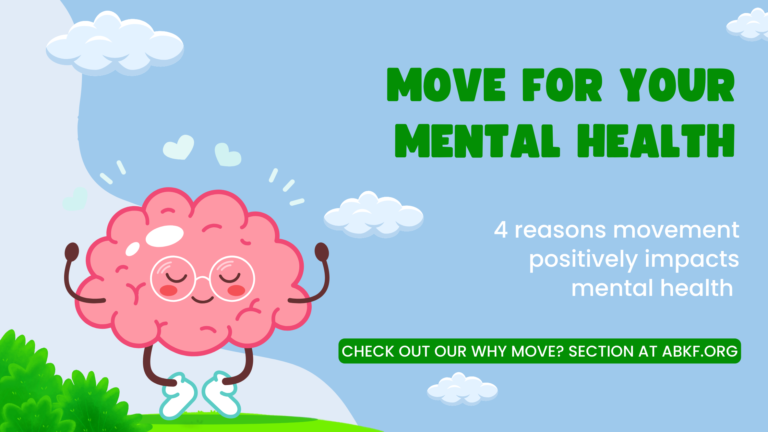
Move For Your Mental Health: Four Reasons Movement Positively Impacts Mental Health
In a world where mental health challenges are on the rise, finding effective ways to support emotional well-being has never been more critical. Among the numerous strategies to promote mental health, movement stands out as a simple yet powerful tool. Science has consistently demonstrated the profound connection between physical activity and mental well-being. Let’s get into the science behind how movement improves mental health, the unique importance of physical activity for children, and why we at AB Korkor Foundation for Mental Health are passionate about working with Fit Kids to bring this life-changing curriculum to underserved communities.
The relationship between physical activity and mental health is backed by decades of research. Studies have shown that movement positively impacts mental health by:
- Reducing Stress and Anxiety: Physical activity decreases levels of the body’s stress hormones, such as adrenaline and cortisol, while simultaneously stimulating the production of endorphins—chemicals in the brain that act as natural mood elevators. For example, a 2018 study published in The Lancet Psychiatry found that individuals who exercised regularly experienced 43% fewer days of poor mental health compared to those who did not exercise.
- Improving Depression: Regular physical activity is as effective as antidepressants in treating mild to moderate depression. A groundbreaking study from Duke University in 1999 demonstrated that exercise can significantly reduce symptoms of depression, with long-lasting effects when practiced consistently.
- Boosting Cognitive Function: Exercise enhances brain function by improving blood flow and stimulating the release of brain-derived neurotrophic factor (BDNF), a protein that supports the growth and survival of brain cells. This not only improves memory and learning but also helps combat cognitive decline.
- Fostering Social Connection: Participating in group physical activities, like fitness classes or team sports, can alleviate feelings of loneliness and build a sense of community—a critical factor for emotional well-being.
For children, physical activity is much more than just a way to burn off energy; it is a cornerstone of their physical, emotional, and cognitive development. Unfortunately, many children in underserved communities lack access to safe spaces and structured programs for exercise. This lack of activity has profound implications that can be detrimental to a child’s development. Physical activity helps children manage stress and anxiety, build confidence, and develop emotional resilience. A 2020 study in the Journal of Pediatrics found that children who engaged in at least 60 minutes of moderate-to-vigorous physical activity daily had significantly lower rates of anxiety and depression. Exercise enhances focus, memory, and problem-solving skills. Research from the CDC shows that students who are physically active tend to have better grades, school attendance, and classroom behavior. Building healthy habits, such as exercise at a young age, fosters lifelong habits that prevent chronic illnesses, including obesity, heart disease, and diabetes.
At AB Korkor Foundation for Mental Health, we are committed to creating opportunities for children to thrive, particularly in underserved communities. One of the ways we achieve this is through our partnership with Fit Kids, a program that provides a K-8 physical activity curriculum designed to make movement fun and accessible. By bringing Fit Kids into schools, we aim to:
Increase Access: Many children in low-income communities lack access to organized sports or safe spaces to play. Fit Kids bridges this gap by delivering engaging physical activity programs directly into schools through custom training and 24 hour access to a digital platform.
Promote Holistic Health: Fit Kids’ curriculum emphasizes the connection between physical activity and emotional well-being, from yoga, meditation to workouts, helping children develop the tools they need to manage stress and build confidence.
Foster Community: Movement-based activities create a sense of camaraderie and teamwork, which are essential for social development.
We have witnessed the transformative power of movement firsthand. Ben Frentsos, Director of the Kids LInk Program in Boseman, Montana, shared:
“We are so appreciative of your support and inviting kidsLINK into the Why Move & Fit Kids program. We now have access to resources that would not have otherwise been available. This has allowed us to emphasize the importance of physical activity and fitness in ways our students in afterschool do not regularly get to experience.”
Stories like this underscore why we are so passionate about making movement a priority in our mental health initiatives.
Movement is more than just a physical activity; it is a vital tool for nurturing mental health and the brain. Whether it’s reducing stress, combating depression, or fostering resilience in children, the benefits of movement are profound and far-reaching. At AB Korkor Foundation for Mental Health, we are proud to champion this cause and work with partners like Fit Kids to bring the gift of movement to those who need it most. Together, we can build healthier minds and stronger communities, one step at a time.
References
- Chekroud, S. R., Gueorguieva, R., Zheutlin, A. B., et al. (2018). Association between physical exercise and mental health in 1.2 million individuals in the USA between 2011 and 2015: A cross-sectional study. The Lancet Psychiatry, 5(9), 739-746.
- Babyak, M., Blumenthal, J. A., Herman, S., et al. (2000). Exercise treatment for major depression: Maintenance of therapeutic benefit at 10 months. Psychosomatic Medicine, 62(5), 633-638. CDC. (2010). The association between school-based physical activity, including physical education, and academic performance. Centers for Disease Control and Prevention.PBS NewsHour: How Exercise may be the most potent medical intervention ever known https://www.youtube.com/watch?v=5LHWXmeZWl4



